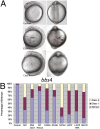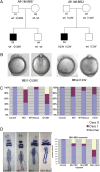Functional analyses of variants reveal a significant role for dominant negative and common alleles in oligogenic Bardet-Biedl syndrome
- PMID: 20498079
- PMCID: PMC2890780
- DOI: 10.1073/pnas.1000219107
Functional analyses of variants reveal a significant role for dominant negative and common alleles in oligogenic Bardet-Biedl syndrome
Abstract
Technological advances hold the promise of rapidly catalyzing the discovery of pathogenic variants for genetic disease. However, this possibility is tempered by limitations in interpreting the functional consequences of genetic variation at candidate loci. Here, we present a systematic approach, grounded on physiologically relevant assays, to evaluate the mutational content (125 alleles) of the 14 genes associated with Bardet-Biedl syndrome (BBS). A combination of in vivo assays with subsequent in vitro validation suggests that a significant fraction of BBS-associated mutations have a dominant-negative mode of action. Moreover, we find that a subset of common alleles, previously considered to be benign, are, in fact, detrimental to protein function and can interact with strong rare alleles to modulate disease presentation. These data represent a comprehensive evaluation of genetic load in a multilocus disease. Importantly, superimposition of these results to human genetics data suggests a previously underappreciated complexity in disease architecture that might be shared among diverse clinical phenotypes.
Conflict of interest statement
The authors declare no conflict of interest.
Figures




Comment in
-
Explaining a rare disorder.Lab Anim (NY). 2010 Jul;39(7):196. doi: 10.1038/laban0710-196b. Lab Anim (NY). 2010. PMID: 20567219 No abstract available.
References
-
- Badano JL, et al. Dissection of epistasis in oligogenic Bardet-Biedl syndrome. Nature. 2006;439:326–330. - PubMed
-
- Slavotinek AM, et al. Mutations in MKKS cause Bardet-Biedl syndrome. Nat Genet. 2000;26:15–16. - PubMed
-
- Katsanis N, et al. Mutations in MKKS cause obesity, retinal dystrophy and renal malformations associated with Bardet-Biedl syndrome. Nat Genet. 2000;26:67–70. - PubMed
-
- Mykytyn K, et al. Identification of the gene that, when mutated, causes the human obesity syndrome BBS4. Nat Genet. 2001;28:188–191. - PubMed
Publication types
MeSH terms
Grants and funding
LinkOut - more resources
Full Text Sources
Other Literature Sources
Molecular Biology Databases

